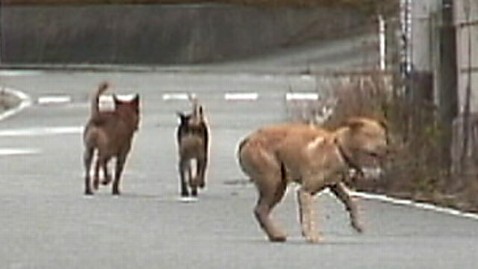Fukushima Pets Running Out of Time

The dogs in Japan's nuclear exclusion zone huddle in what remains of earthquake-ravaged homes, burying themselves in a mix of debris - newspapers and torn blankets - to fend off the cold.
Those too weak to move lie on the floor waiting for help to come, as they have for more than 10 months.
"The government keeps saying there are few pets left, but we see their footprints in the snow," Yasunori Hoso of the United Kennel Club of Japan said. "They are fighting to stay alive."
Nearly a year after a catastrophic earthquake and tsunami triggered the Fukushima nuclear disaster and forced 80,000 to evacuate their homes, Hoso is leading an urgent push to save the animals left behind. The fallout from the reactors has turned the 12-mile area around the nuclear plant into a no-man's wasteland, where cows and ostriches share empty roads, and cats feast on frogs and snakes.
The sub-freezing temperatures have made the situation worse. With food scarce, Hoso says 20 to 30 pets are dying every day.
"They have little fat left, so there's nothing to keep them warm," Hoso says. "Many animals have died of hypothermia, but we believe there are more than 100 still living."
Hoso led a team of volunteers into the zone in December for the most extensive animal rescue to date.
He said it took the central government nine months to authorize the search, although he and pet owners had been pleading for help since March.
Volunteers set up traps in gas stations and left food outside homes to lure the animals back. Together, they rescued 290 cats and 34 dogs.
The animals now sit in a temporary shelter Hoso set up for owners who cannot take their pets back. Many people remain in temporary homes themselves, where animals are not allowed. The government has said their hometowns might not be habitable for decades.
Each animal caged at Hoso's shelter tell a harrowing tale. Shiba Inu mixed-breed "Sievert," named after the radiation measurement because of his high exposure, was hit by a car less than a mile from the Fukushima plant, his legs crushed. After extensive surgery, he is walking again.
Hoso says another dog survived 39 days, chained to his home without food or water. He died just days after reuniting with his family. "These animals may not be able to speak, but they are fighting," Hoso said. "They are doing everything they can to stay alive."